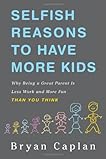 Selfish Reasons to Have More Kids: Why Being a Great Parent is Less Work and More Fun Than You Think by Bryan Caplan
Selfish Reasons to Have More Kids: Why Being a Great Parent is Less Work and More Fun Than You Think by Bryan Caplan
This is a great title, in that it enticed me to pick this up, and it’s a bad title, because it would be more accurately titled “good reasons to have more kids.” Most of this book is what you think it is–reasons why having more children is a good idea. Some of it, however, is a trickle of the much awaited (by me) backlash against hyper-vigilant paranoid overparenting. If you put this book and that Tiger mom book in the same room, they’d probably bind together with subatomic force, that’s how opposite these schools of thought are.
This hit me a few years too late to influence my more-kid lobbying efforts, but I could see people reading this book and deciding in favor of having a larger family. His arguments are compelling. For example, his main argument is that your kids are going to turn out just like you no matter how you raise them, so don’t fret too much. As long as you’re an adequate parent, you’re fine. He uses twin studies to back up this theory. This, of course, will grate with the people that think that their parenting efforts have significant impact on their children’s development. Which school of thought you fall into will likely influence how spurious or compelling you find his argument.
The part of the book I enjoyed the most talked about how much safer life is for people in general and children in particular since 1950. I rejoiced because I hate the people who silently (and not so silently) condemn me for allowing my children to have a small measure of independence (walk to grandmommy’s house, eg.) because “it’s just not safe anymore.” People watch “CSI–Horrible Child Sex Torture Edition” and they forget that it’s fiction. They see whatever horrific crime CNN has dredged from the sludge and they think that it’s prevalent, just because CNN manages to find one every couple of weeks. Here are the facts: It’s safer to be a kid now than a kid in 1950.
The third tier of his argument is that having kids is a huge upfront cost that will pay for itself later. Ask yourself not how many kids you want now, but how many kids you want when you are 60. He also offers having lots of kids (and providing bribes to the ones you have) as a strategy for having more grandkids. This, I know from experience, has limited success.*
The reason why the title is inaccurate is that “selfish” is not a word that I associate with “good and compelling.” There are, as Caplan provides, reasons why having a child makes the world a better place. Here’s the most compelling one, that is obvious but that most people don’t consider: unless your life is horrid, you’re probably glad you were born. Having a baby is good for the baby. It gets to live. So, if you’re glad to be alive, thank your mom. (Thanks, mom!)
The last part of the book was my least favorite. In it, the author has a dialog with several other people who either partially agree or strongly disagree with him. I found the format (that of a talk show or script) to be unnatural, and I eventually just stopped reading at that point. One aspect of the author’s writing that I did enjoy was that he used a breezy, conversational style for the first part of each chapter, and then back-loaded it with the stats and research.
Even if you’re not in a position to increase your family size, this is an interesting read because of the safety stats and the twin studies. If you are in a position to increase your family size, and are on the fence about it, this might be a good read because it will likely get you off that fence.
*Mom, Dad, I know you’re reading this. Don’t get your hopes up. I’m not pregnant, and bribes won’t change that.
